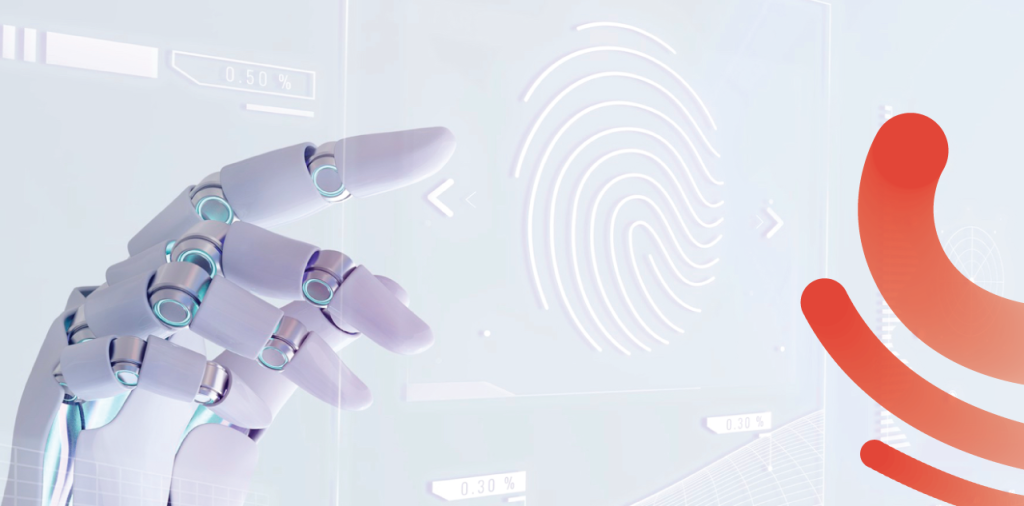Cybersecurity Awareness Month: Using AI in Cybersecurity

Held every year since 2003, October is recognized as Cybersecurity Awareness Month. CSAM was created to raise awareness about the importance of cybersecurity and ensure that every individual stays safe and secure online. Here at .ME, we often find ourselves discussing the importance of personal accountability, the need to take proactive steps and be cyber-safe both at work and at home/otherwise.
Now more than ever, it’s important to understand the risks of cybersecurity and how to protect your information and your identity. In the spirit of Cybersecurity Awareness Month, we’re bringing you a short overview of how AI can be associated with cybersecurity and benefits of using AI in cybersecurity.
But let’s start with the basics.
First Of All, What Is Cybersecurity?

Cybersecurity is a set of measures and techniques used to protect digital information, network, devices and resources from cyber attacks. So, cybersecurity implies all activities implemented to protect the system from unauthorized access.
With the increase of our online presence, there is also a need to increase the level of our protection in the digital world. Cybersecurity lays down on three main pillars: confidentiality, integrity and availability (also known as CIA).
Let me explain what exactly each of these words mean:
- Confidentiality ensures that only authorized person can access to data
- Integrity ensures that the data has to be accurate
- Availability ensures that data can be delivered on demand, at any moment
If you’re interested to learn more about cyber threats, you can check out our blog post where you can have a detailed explanation about different threats in cyberspace. And if you are interested to learn more about phishing (specifically, how to recognize it), please, take a look at our blog here.
Now let’s go back to AI in Cybersecurity and the most important question that’s going through your minds right now.
Is AI In Cybersecurity Advantage Or A Threat?

This is one of those questions that can be difficult to answer. You see, artificial intelligence poses both a blessing and a curse to businesses, customers, and cybercriminals alike.
AI technology is what provides us with speech recognition technology (think Siri), Google’s search engine, and Facebook’s facial recognition software. We all know that. Also, some credit card companies are now using AI to help financial institutions prevent billions of dollars in fraud annually. Awesome, right? But what about its applications in cyber security? Is artificial intelligence an advantage or a threat to your company’s digital security?
On one hand, artificial intelligence in cyber security is beneficial because it improves how security experts analyze, study, and understand cybercrime. It enhances the cyber security technologies that companies use to combat cybercriminals and help keep organizations and customers safe.
On the other hand, artificial intelligence can be very resource intensive. It may not be practical in all applications. More importantly, it also can serve as a new weapon in the arsenal of cybercriminals who use the technology to hone and improve their cyberattacks.
How Can Using AI In Cybersecurity Actually Boost Your Security?

Forms of artificial intelligence (AI) have existed since the 1950s, but the technology is now rapidly expanding at scale for two reasons. More powerful and more affordable computer chips that make it possible for organizations of all sizes to access AI. And the explosion in digital data which provides the information for training AI systems.
The use cases are everywhere in our daily lives, from email spam filters to virtual assistants. However, as digitization spreads, the risk of attacks from bad actors accessing connected devices or systems increases, making AI an increasingly important area for cybersecurity.
AI will revolutionize cybersecurity, due to its superior ability to scan enormous volumes of data for anomalies and flag up risk. And here’s how it’s going to do it.
#1: AI In Cybersecurity Mitigates Cyber Threats
AI technology could help businesses to detect cyber attacks, by identifying vulnerabilities and suspicious behavior. Currently 91% of cyberattacks do not generate an alert, and companies take on average 207 days to identify and 73 days to contain a breach. Additionally, AI can analyze events rapidly, helping cybersecurity teams to keep pace with risks and associated financial and reputational losses.
AI can help to predict cyber threats. For example, financial institutions have anti-fraud systems that use algorithms to scan through large pools of data, identify patterns of typical behavior, and make predictions of potential fraud. Such insights can feed directly into the development of systems to prevent cyber attacks. These systems are also becoming a must-have for marketplaces, airlines and all companies with customer loyalty programs.
#2: AI In Cybersecurity Strengthens Data Security

Another reason why organizations use AI technology is to strengthen their data governance process. For example, AI can sift through a variety of sources to identify sensitive data which businesses can then anonymize, remove, encrypt or protect in other ways from any external or internal threats. Such uses of data allow businesses to handle confidential information securely and comply with privacy standards and regulations such as the GDPR. Similarly, AI can create synthetic data, to create scenarios and forecast future cyber exposures.
#3: AI-powered Biometric Authentication
AI is also taking biometrics to a new level. For example, facial recognition metrics always vary – there can be a different angle of head tilt, different distance between features, lighting, or facial expression. The same applies to voice recognition and other biometrics. It is impossible to set fixed rules of recognition, so AI analyzes these deviations of metrics within the specified ranges, makes decisions accordingly and learns continuously. Also, AI can help to identify users and differentiate them from bots and automatic attacks, by analyzing unique behavioral biometrics such as keystroke, scroll and swipe patterns.
Key Takeaway

Here’s the thing: AI is a powerful tool for both cybercriminals and cybersecurity experts. Hackers are using AI to make their attacks more sophisticated and harder to detect, while cybersecurity specialists are finding ways of integrating AI into corporate cybersecurity systems to minimize financial and reputational losses.
According to the World Economic Forum Global Cybersecurity Outlook 2022 report, 48% of executives believe that artificial intelligence (AI) will influence cyber transformation in the next two years.
Artificial intelligence and machine learning are providing new ways for cybercriminals to attack an organization’s network. But businesses can use it equally to keep their data safe.
For many years .ME Registry has put many efforts to keep the customer’s experience safe and its online presence secure. Our goal is to be proactive to domain abuse and try to keep abuse at minimum. Here at .ME, we are doing our best to keep your online home address safe.
